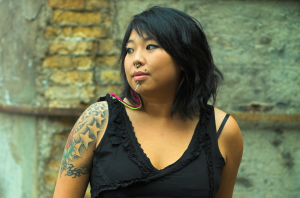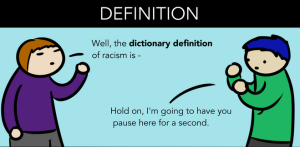While I’ve always known that I was Black, I wasn’t confronted with my minority status, and what that meant, until high school.
My father worked really hard to get me into an elite private school, and I was able to pay for it with an academic scholarship. It terms of college preparedness and quality of education, my father could not have picked a better school.
The only thing was that I was one of five black students.
I felt like I was under a microscope all of the time.
Teachers were visibly distraught over my name when taking attendance at the beginning of the school year. (For the record, it’s pronounced “Juh-knee-cuh”)
Talks about slavery and the civil rights movement in history classes were extremely awkward, but not as awkward as being the only black kid in my vocal jazz choir while performing negro spirituals. I was also asked to define black vernacular and about my hair way too much.
But I got through it.
I didn’t need high school to be a memorable experience. I recognized it as just a stepping stone to the rest of my life, so I ignored the microaggressions I faced.
It wasn’t until my senior year, however, that I realized that ignorance came at a cost. A cost I would unfortunately have to pay.
At the time, all I knew was that I had accomplished something great: I was graduating high school and would be the first in my immediate family to get through college. And I had gotten into my top choice college!
I was feeling pretty awesome until someone I had considered a friend remarked that I had only been accepted because I was black.
Talk about raining on my parade. It happened so casually too, as if it the statement was so obvious that it didn’t require another thought. But it still stings to this day.
And damn, if that were actually the case I wouldn’t have tried as hard. I exhausted myself in high school with honors and AP courses and quite a few extracurriculars.
But I always had something to prove. I thought I had to prove that I belonged because black students are not expected to be succeed.
It wasn’t until I was suddenly a black dot in a sea of white that I became hyper aware of this, and that’s when I became more anxious to be perfect.
For black students in particular, we have to fight stereotypes that we’re lazy, unintelligent, and disruptive. I had to overcome this to prove that I was just as smart and competent as my white peers.
Black adolescents make up a majority of those affected by the school to prison pipeline, which are factors that push kids out of school and increases their chances of landing in jail at some point in their lives. For instance, black students, especially black girls, are suspended at higher rates than any other demographic, and all of that time out of school can lead them to prison.
The list of insidious ways in which black people are kept incarcerated and uneducated is endless.And while I was somewhat sheltered from that in a private school, I still had to distance myself from the negativity of being black in the United States.
So I had to be perfect.
So, What Exactly Is Perfectionism?
Perfectionism the tendency to set high expectations and drive yourself to achieve flawlessness. It’s also being overly critical of yourself and sensitive to critique from others.
Perfectionism also goes hand and hand with imposter syndrome which affects high achieving women in male dominated fields and people of color.
Imposter syndrome is the idea that we don’t belong, and that we’ve fooled everyone into believing that we’re smarter and more capable than we actually are.
The best way to explain this phenomenon is like this: it’s the little voice in your head that says “Wow, I don’t fit in here. Everyone is so much smarter than I am, they’re going to think I shouldn’t be here, how did I get here?”
As a black student, this usually parallels with wanting to prove your worth, and proving that you can rise above negative stereotypes.
So many minority students feel complex and heavy burdens to perform a certain way, which may lead to perfectionist tendencies.
Sound familiar?
If you’re a black student reading this and nodding your head, you might be a perfectionist. I get you! Perfectionism is difficult to cope with, but it is far from impossible. Here are some tips to make your determination and drive to achieve great things a reality while not letting your perfectionism get you down:
1. Know How Your Perfectionism Manifests
Everyone thinks that perfectionism is overachieving, getting things done perfectly, and having a type A personality — but that’s not always the case.
Perfectionism looks differently for all perfectionists.
For example, I have a huge fear of failure and I don’t take well to criticism, like most perfectionists. This weight is especially heavy for black students who feel the need to prove others wrong and speak for their race.
It’s unfair, but it’s our reality. When we are in toxic, racist environments — and sometimes even when we are not — our every movement and our choices reflect on our entire race and culture. The added stress of being the “spokesperson” for our race can drive us to be overly-critical of ourselves–the perfectionist’s trademark.
So in order to figure out how your perfectionism manifests, consider the following questions: What stresses you out the most about assignments and projects? What do you do when you feel like something won’t be done right the first time? How do you feel the closer you get to a deadline? Do you feel like a result that is less than perfect will disappoint anyone? How does that make you feel?
2. Figure Out Methods That Work Best for You
So you’ve named the problem, now what? You need to figure out methods to combat it.
As a black student, you do not have to carry the burden of proving your self worth to anyone else. You need to take care of yourself and your needs first.
For some, this may look like ignoring the doubting voice in your head that says you aren’t doing enough, or that your actions represent the entire black community.
Do what’s best for you and just get it – whatever it is at the moment – done.
Find out which study methods work best for you and make you feel the least anxious. Take lots of short breaks (emphasis on short). Tell yourself that you’re doing the best you can, because you are.
Assignments and other tasks always feel like the very worst thing ever while you’re doing them. You’re caught up with overwhelming self doubt and fear of letting people down, but you have to remember that you are a person and you have permission to not be perfect.
3. Ask for Help When You Need It (No, Really)
In retrospect, this is something I wish I had done more of in college. There were a ton of academic resources and workshops available to us to help us cope with stress, time-management, and pressure to succeed that I would have benefitted from, but my pride got the best of me (another lovely perfectionist trait).
So please don’t miss out like I did! Seek out these resources.
My college also had programs that were tailor-made for students of color, and I’m sure other colleges do as well. It might take some research, but the resources are there.
And if you’re comfortable with the idea, the mental health facilities are included in your sky-high tuition, so why not use them? You don’t have to carry this heavy burden on your own.
But seeking help doesn’t always look like going to the counseling facilities. It could be joining a group or organization of like minded people with similar shades of brown as you, which leads me to my next piece of advice:
4. Connect with Others Like You
A lot of campuses have student associations for different ethnicities that make wonderful support groups. Seeking out friendly people on your own is also an option. I have a dear friend from high school who is also black that sat next to me one day at a student assembly, and later confessed to seeking me out because she finally had someone to relate to!
It helps when you find a group of people that look like you and share your culture. You feel less alone, and you’ll be able to talk things out with people who will understand where you’re coming from.
They are able to view academic experiences in similar ways as you are. They can empathize in certain ways that white friends may only be able to sympathize. They are able to laugh with you through the most painfully awkward situations.
Having friends that look like us and know where we’re coming from can help when navigating an institution that wasn’t necessarily built to accommodate us — much less support our health and well-being.
Perfectionism among minority students isn’t uncommon, and you’ll benefit from the support of other people who can relate.
***
I learned invaluable truths about myself by the time I graduated college, and by that time I had also gained a diverse and wonderful group of friends who helped get me through the barriers and microaggressions I faced as a black student in predominately white institutions.
I learned that I am eager to learn, and that my education is important to me. But I also learned that people will treat me differently on account of my brown skin, my name, and where I come from.
I learned that I need to shoot for the moon to make up for the fact that I’m black and from a working class family.
I learned that I have a complex need to always be the best.
But thankfully, I have realized that I am not alone in this struggle, and that asking for help and seeking the company of other friendly brown faces helps me feel less alone.
It’s a difficult process to learn how your perfectionism manifests and the best ways to manage it. But seeking help when you need it and connecting with others like you are invaluable tools in easing the burden of being one of the few black faces in very white spaces.
It’s common for perfectionists to think that they can do everything alone, but a supportive network of people who get where you’re coming from without explanation is worth putting yourself out there – even at the risk of appearing imperfect.
[do_widget id=’text-101′]
Jenika McCrayer is a Contributing Writer for Everyday Feminism. A Virginia native with a BA in Women and Gender Studies from The College of William and Mary, she is currently pursuing an MA in the same field. Jenika also enjoys good books, bad horror films, naps, and the beach. Follow her on Twitter @JenikaMc.
Search our 3000+ articles!
Read our articles about:
Our online racial justice training
Used by hundreds of universities, non-profits, and businesses.
Click to learn more





















